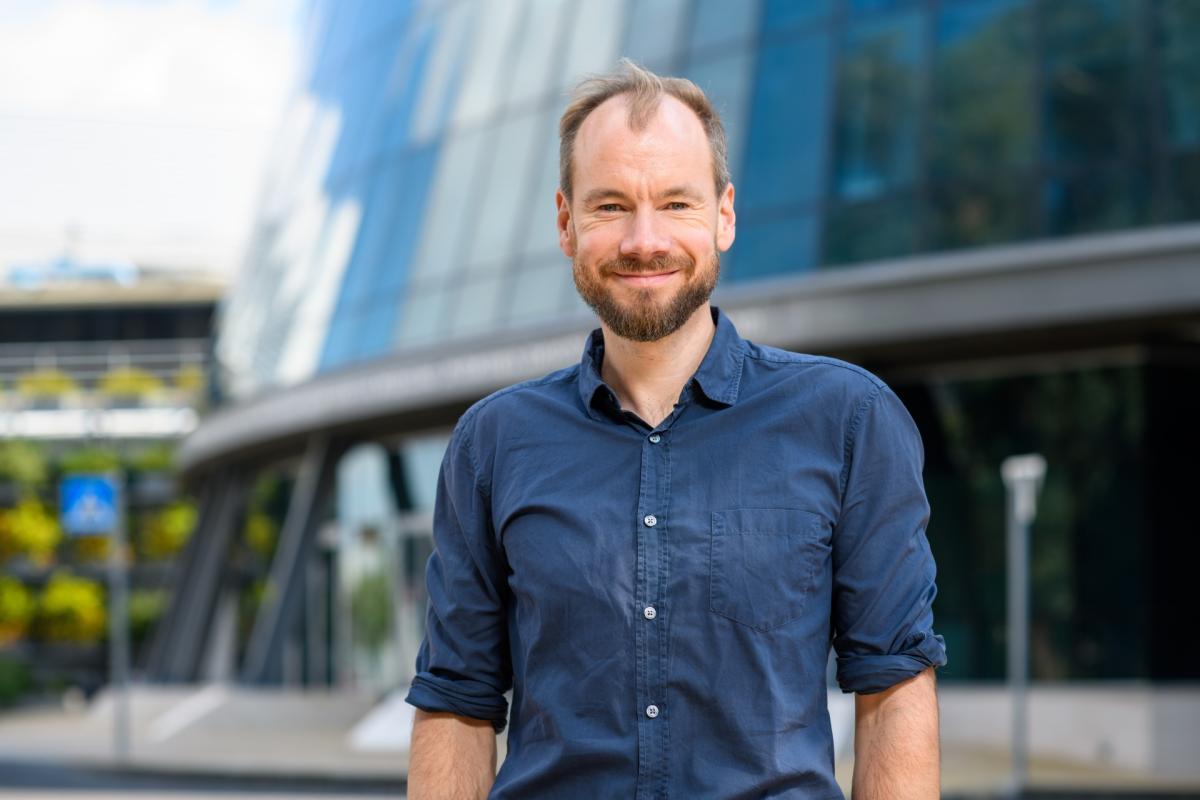Dr. Martin Sperfeld

Dr. Martin Sperfeld
Staff of Professorship for Microbiome Research
ETH Zürich
Professur für Mikrobiomforschung
Additional information
Research Area
My research revolves around the intricate interactions between phototrophic and heterotrophic microorganisms – a microbial pair that builds the foundation for life on Earth. I am currently investigating the interplay between reef associated phototrophs and heterotrophs by utilizing a tripartite model system composed of symbiotic algae, associated bacteria and sea anemones. This study builds on earlier research in which I investigated bacteria that metabolise naturally occurring algal compounds or anthropogenic pollutants.
My microbiological training is rooted in classical molecular biological methods with focus on bacterial physiology and metabolism. In recent years, I expanded my microbiological toolbox towards 'omics analysis, with a specific interest in short read and long read RNA sequencing.
Education & Research Experience
11/2023 - current: Postdoc at Shinichi Sunagawa lab (ETH Zurich, Switzerland); Protists-bacteria interactions in reef ecosystems.
05/2018 - 08/2023: Postdoc at Einat Segev lab (Weizmann Institute of Science, Israel); Algal-bacterial metabolic exchange and its consequences for the bacterial lag phase.
08/2014 - 05/2018: PhD, Microbiology at Gabriele Diekert lab (Friedrich Schiller University Jena, Germany); Anaerobic aromatic compound degradation by microbial consortia.
01/2013 - 07/2014: Research assistant at Gabriele Diekert lab (Friedrich Schiller University Jena, Germany); Development of a novel in-situ bioremediation approach.
10/2010 - 10/2012: MSc, Microbiology at Gabriele Diekert lab (Friedrich Schiller University Jena, Germany); Biochemistry of O-demethylases involved in metabolizing lignin monomers.
09/2007 - 07/2010: BSc, Life Sciences at Hubert Bahl lab (University Rostock, Germany); Synthetic production of aceton by E. coli.
08/2009 - 09/2009: Student research project at Kingsley Dixon lab (Kings Park & Botanic Garden, Australia); The microbial diet of a carnivorous plant.
Awards, Fellowships & Grants
2022: Excellence Award of the Plant and Environmental Sciences Department (Weizmann Institute, Israel).
2022: ePoster Award of the Annual Conference of the Association for General and Applied Microbiology (VAAM, Germany).
2021: Senior Postdoctoral Fellowship (Weizmann Institute, Israel).
2019: Sir Charles Clore Postdoctoral Fellowship (Clore Israel Foundation, Israel).
2019: Dean of Faculty Fellowship (Weizmann Institute, Israel).
2014: Landesgraduiertenstipendium (PhD Fellowship, State of Thuringia and Friedrich Schiller University Jena, Germany).
2009: Travel grant for international internship (DAAD, German Academic Exchange Service).
Publications
Narváez-Barragán, D.A., Sperfeld, M., and Segev, E. (2025). DmdA-independent lag phase shortening in Phaeobacter inhibens bacteria under stress conditions. The FEBS Journal. https://doi.org/10.1111/febs.70128.
Sperfeld, M., Narváez-Barragán, D.A., Malitsky, S., Frydman, V., Yuda, L., Rocha, J., and Segev, E. (2024). Algal methylated compounds shorten the lag phase of Phaeobacter inhibens bacteria. Nature Microbiology. https://doi.org/10.1038/s41564-024-01742-6.
Eliason, O., Malitsky, S., Panizel, I., Feldmesser, E., Porat, Z., Sperfeld, M., and Segev, E. (2024). The photo-protective role of vitamin D in the microalga Emiliania huxleyi. iScience. https://doi.org/10.1016/j.isci.2024.109884.
Abada, A., Beiralas, R., Narvaez, D., Sperfeld, M., Duchin-Rapp, Y., Lipsman, V., Yuda, L., Cohen, B., Carmieli, R., Ben-Dor, S., Rocha, J., Huang Zhang, I., Babbin, A. R., and Segev, E. (2023). Aerobic bacteria produce nitric oxide via denitrification and promote algal population collapse. The ISME Journal. https://doi.org/10.1038/s41396-023-01427-8.
Despotović, D., Aharon, E., Trofimyuk, O., Dubovetskyi, A., Cherukuri, K.P., Ashani, Y., Eliason, O., Sperfeld, M., Leader, H., Castelli, A., Fumagalli, L., Savidor, A., Levin, Y., Longo, L. M., Segev, E., and Tawfik, D. S (2022). Utilization of diverse organophosphorus pollutants by marine bacteria. PNAS. https://doi.org/10.1073/pnas.2203604119.
Sperfeld, M., Yahalomi, D., and Segev, E. (2022). Resolving the microalgal gene landscape at the strain level: a novel hybrid transcriptome of Emiliania huxleyi CCMP3266. Appl Environ Microbiol. https://doi.org/10.1128/AEM.01418-21.
Sperfeld, M., Diekert, G., and Studenik, S. (2018). Community dynamics in a nitrate-reducing microbial consortium cultivated with p-alkylated vs. non-p-alkylated aromatic compounds. FEMS Microbiology Ecology. https://doi.org/10.1093/femsec/fiy200.
Sperfeld, M., Diekert, G., and Studenik, S. (2018). Anaerobic aromatic compound degradation in Sulfuritalea hydrogenivorans sk43H. FEMS Microbiology Ecology. https://doi.org/10.1093/femsec/fiy199.
Sperfeld, M., Rauschenbach, C., Diekert, G., and Studenik, S. (2018). Microbial community of a gasworks aquifer and identification of nitrate-reducing Azoarcus and Georgfuchsia as key players in BTEX degradation. Water Research. https://doi.org/10.1016/j.watres.2017.12.040.
Guo, H., Rischer, M., Sperfeld, M., Weigel, C., Menzel, K.D., Clardy, J., and Beemelmanns, C. (2017). Natural products and morphogenic activity of γ-proteobacteria associated with the marine hydroid polyp Hydractinia echinata. Bioorganic & Medicinal Chemistry. https://doi.org/10.1016/j.bmc.2017.06.053.
Sperfeld, M., Diekert, G., and Studenik, S. (2014). Kinetic regulation of a corrinoid‐reducing metallo‐ATPase by its substrates. Molecular Microbiology. https://doi.org/10.1111/mmi.12582.